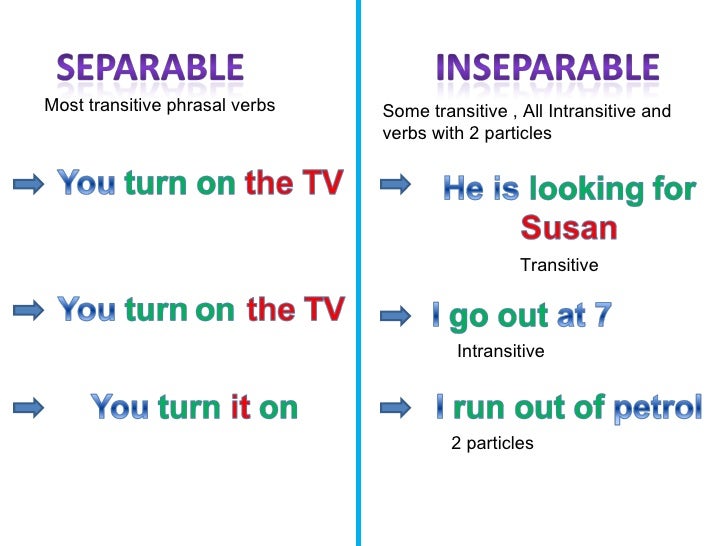I can hear you asking me : Why should I learn Phrasal verbs?
Well, a word of advice : They are essential to understanding everyday/ naturally spoken English/films. Native speakers use phrasal verbs regularly and so, it will benefit you to understand them a dash better.
Tip: Try to learn at least 5 per week and then with that, 5 synonyms/ full verbs and their collocations. ( E.g : Get into + art,music, series = To start enjoying something.Come across + an old friend, a lost item, a book, a new word = find by accident.)
Nota bene: Full verbs are best used in writing/ formal conversation.
A phrasal verb by definition, is a two or three word verb: (a verb + a preposition or verb + adverb.) We can modify the use of a verb for more meaning/ to change the meaning of the verb by adding a particle/creating a phrasal verb. ( Examples of the particle : Up, On, In, At.Over.)
Phrasal verbs can be transitive or intransitive.
NOTES:
Intransitive phrasal verbs have no direct object.(A direct object is “acted upon” by the verb).
Transitive phrasal verbs can be separable or inseparable.Transitive phrasal verbs have a direct object.

NB: Always place a pronoun between the verb and particle if you find it is seperable! ''Turn it on.'', NOT: ''Turn on it.''.
Let's look at some Phrasal verbs and then answer some questions as we go along !
Understanding the particle in English will help you understand Phrasal verbs even better:
To pick up/ Pick + someone + up = Move in a car with someone -( To transport.)
Example: I will pick you up at 5p.m
Has a friend ever picked you up? Where did you go? Have you ever picked someone up before?

Pull up = To approach/To move closer to someone / somewhere.
Example: I pulled up a seat to sit closer to the board.
Have you ever pulled up a chair for someone? When do you think we should? Do you think it is polite if a man pulls up a chair for a woman?
Move up = Movement /To literally stand and move towards the left or right.
Example: Please move up, so more people can sit on the couch.
Have you ever moved up for someone to sit next to you on a bench?
Have you ever asked someone to move up because they were taking too much space? What happened? Were they polite?
Brighten up = To increase/improve or To provide more light into a dark space/ To become more cheerful/ happier.
Examples: The colourful flowers really brighten up the office! Brighten up, do not be sad - things will get better !
What do you do to brighten up when having a bad day? How can we brighten up someone's day?
Have you ever refurbished your home ? How did you brighten it up? ( Decorate/improve it.)
Clean up = To improve how a place/person looks.
Examples: You have really cleaned up the office, it looks much better! I think Sara cleans up well - she looks great in formal clothing !
Note: Clean up is a phrasal verb which means: to make (a room or space) clean and orderly. ... Clean out is a phrasal verb which means something such as a cupboard, room, or container, you take everything out of it and clean the inside of it thoroughly. Clean = can mean one item or many / used more frequently than ''clean up.''.
Do you have a regular schedule for cleaning up your home? Why? Does anyone help you clean up? Do you enjoy cleaning up?
Your turn ! Can you make two sentences with each of the above Phrasal verbs ?
These two examples show you things that help you remember phrasal verbs, according to http://www.phrasalverbdemon.com/:
Keep down:
Try to remember... Logic of the particle: Down sometimes means reducing.
Example: Please keep your voice down, the neighbors are complaining.
A Couple of collocations: you can keep down your voice, the noise, your weight,bad food.
Grammar: you can separate it. You can say ,‘’keep your voice down’’ and ‘’keep it down ‘’.
Come across:
Try to remember... Logic of the particle: Across sometimes means finding.
Example: I came across an old school friend of mine when I was travelling in Zimbabwe.
A Couple of collocations: you can come across a friend, an old photograph, a new place.
Grammar: you can't separate it. You can say come across an old friend but you can't say come an old friend across or come him across.

No comments:
Post a Comment